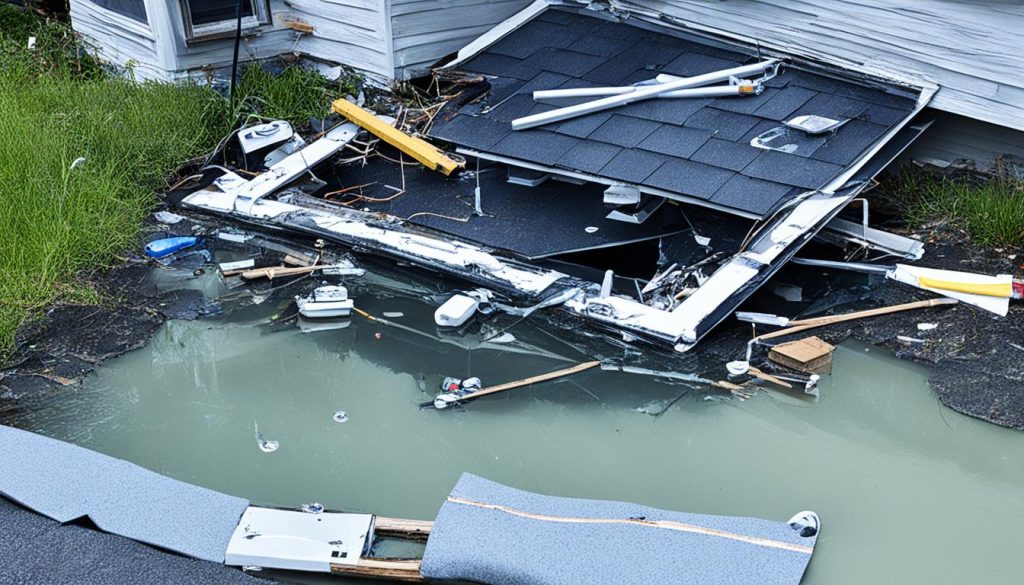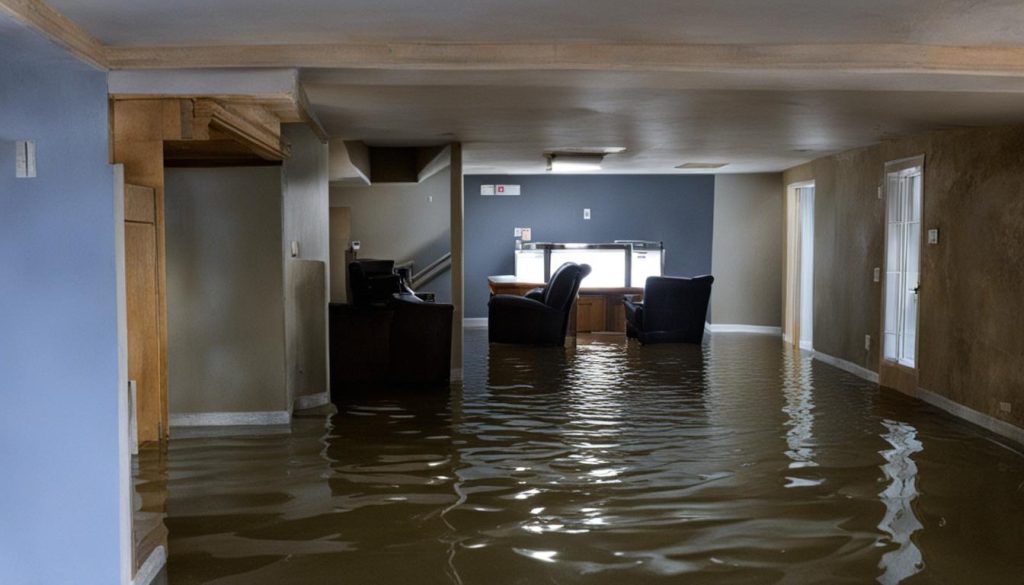Does Home Insurance Cover Plumbing? Find Out!
Did you know that plumbing issues are one of the most common claims in home insurance? It’s true! From burst pipes to water heater ruptures, plumbing failures can cause significant damage to your home and belongings. But does your home insurance policy provide coverage for these types of repairs and damages? Let’s explore the ins and outs of home insurance coverage for plumbing and what you need to know to ensure you’re protected.
Key Takeaways:
- Homeowners insurance typically covers accidental water damage caused by plumbing failures.
- Coverage includes residence coverage, possessions coverage, and additional living expenses coverage.
- Lack of maintenance, flooding, and damage from mold growth are often not covered.
- Review your policy, consider optional riders, and maintain your plumbing system to ensure proper coverage.
- Consult with your insurance provider to understand your specific coverage options and needs.
What is Homeowners Insurance and Plumbing?
Homeowners insurance, also referred to as home insurance, is a type of insurance that provides coverage for a private residence. It offers financial protection for a variety of losses and damages, including damage to the house itself, loss or damage of personal assets, and liability claims resulting from injuries on the property. Each homeowners insurance policy has a liability limit that determines the amount of coverage you will receive under various circumstances. It’s important to review your policy to understand if it covers damage to your home due to plumbing issues.
Key Features and Benefits
- Financial protection for your home and personal assets in the event of plumbing-related damages
- Coverage for repairs and replacements of damaged plumbing systems
- Liability coverage for injuries that occur on your property
- Additional living expenses coverage for temporary relocation due to plumbing emergencies
Understanding Coverage Limits
It’s important to note that homeowners insurance policies have coverage limits, which determine the maximum amount the insurance company will pay for plumbing-related damages. Review your policy to understand the coverage limits and ensure they align with your needs. Additionally, some policies may offer optional endorsements or riders that provide additional coverage specifically for plumbing issues. Consider speaking with your insurance provider to explore these options.
Reviewing Your Policy
To fully understand the extent of your homeowners insurance coverage for plumbing, it’s crucial to review your policy and familiarize yourself with the terms and conditions. Pay particular attention to the sections that outline coverage for plumbing repairs, exclusions, and any optional coverages that may be available. If you have any questions or need clarification, don’t hesitate to reach out to your insurance provider for assistance.
| Coverage | Examples |
|---|---|
| Residence Coverage | Structural damage caused by burst pipes |
| Possessions Coverage | Damage to personal property caused by a plumbing failure |
| Additional Living Expenses Coverage | Costs associated with temporary relocation due to plumbing emergencies |
What Plumbing Damage is Covered by Homeowners Insurance?
When it comes to home insurance, it’s essential to understand what plumbing damages are covered. Homeowners insurance typically provides coverage for accidental water damage caused by plumbing failures. This includes damages caused by burst pipes, ruptured water heaters, or other plumbing-related disasters.
There are three main types of damages covered by home insurance:
- Residence Coverage: This type of coverage includes damage to the structure of your home. If your plumbing failure leads to structural damage, such as walls or ceilings being affected, your home insurance policy should cover the repairs.
- Possessions Coverage: Home insurance also provides coverage for damaged personal property. If items in your home are damaged due to a plumbing issue, such as furniture, electronics, or appliances, you can file a claim to receive compensation for the repairs or replacement.
- Additional Living Expenses Coverage: In some cases, plumbing failures can result in the need for temporary relocation due to emergency repairs. Home insurance policies often include coverage for additional living expenses incurred during this period. These expenses may include hotel stays, meals, and other necessary costs.
It’s important to note that coverage may vary depending on your specific policy and insurer. To fully understand the extent of your plumbing coverage, it’s recommended to review your policy thoroughly and contact your insurance provider for any additional information.
| Common Plumbing Claims Covered by Homeowners Insurance | |
|---|---|
| Burst Pipes | Damage caused by pipes that burst due to freezing temperatures or other issues. |
| Ruptured Water Heater | Damage caused by a water heater malfunction, leading to leaks or water damage. |
| Plumbing Leaks | Damage caused by plumbing leaks, including damaged walls, floors, or ceilings. |
| Clogged Sewer Lines | Damage caused by clogged sewer lines, resulting in backups or water damage. |
| Water Damage from Plumbing Fixtures | Damage caused by broken faucets, toilets, or other plumbing fixtures. |
While these are some common examples of plumbing claims covered by homeowners insurance, it’s important to read your policy carefully and consult with your insurance provider for complete details on your coverage.
What Plumbing Failures are Not Covered by Homeowners Insurance?
While homeowners insurance typically covers sudden or unexpected water damage caused by plumbing failures, there are some situations where plumbing repairs may not be covered.
Lack of Maintenance: Damage resulting from a lack of maintenance, such as slow leaks or neglecting to address minor issues, is usually not covered by standard homeowners insurance policies. It’s important to regularly inspect your plumbing system, address any leaks or plumbing issues promptly, and keep up with routine maintenance to prevent potential damage.
Flooding or Water Backups: Damage caused by flooding or water backups is also typically not covered by standard homeowners insurance. If you live in an area prone to flooding, it may be worth considering additional flood insurance to protect your home and belongings.
Mold Growth: Damage from mold growth, which can occur as a result of plumbing issues, is generally not covered by standard homeowners insurance. Preventing mold growth by promptly addressing plumbing leaks or water damage is crucial to avoid costly repairs and potential health issues.
Optional Riders: Some insurance companies may offer optional riders or endorsements that can be added to your homeowners insurance policy to cover specific plumbing-related damages that may not be included in the standard coverage. It’s advisable to consult with your insurance provider to understand the availability and cost of these additional coverages.
To ensure you have the right coverage for plumbing-related issues, it’s crucial to review your policy, communicate with your insurance provider, and consider any optional riders or endorsements that may be available to you.
| Plumbing Failures | Homeowners Insurance Coverage |
|---|---|
| Lack of Maintenance | Not Covered |
| Flooding or Water Backups | Not Covered |
| Mold Growth | Not Covered |
| Optional Riders | Available (at additional cost) |
Tips for Ensuring Plumbing Coverage in Home Insurance
When it comes to protecting your home from plumbing issues, having the right coverage in your home insurance policy is essential. Here are some tips to ensure that you have adequate plumbing coverage:
1. Review your policy: Take the time to thoroughly review your home insurance policy to understand what is covered and what is not. Familiarize yourself with the specifics of your plumbing coverage to avoid any surprises when filing a claim.
2. Consider optional riders: Standard home insurance policies may not cover all plumbing-related damages. Consider adding optional riders or endorsements, such as sewer backup coverage or overland water coverage, to protect against specific plumbing issues that may not be covered by your standard policy.
3. Maintain your home and plumbing system: Regular maintenance is key to preventing plumbing disasters and ensuring coverage. Inspect your pipes regularly for leaks, address plumbing issues promptly, and consider professional drain cleaning services to prevent blockages. Proper maintenance can help avoid claims being denied due to lack of upkeep.
4. Communicate with your insurance provider: Keeping an open line of communication with your insurance provider is crucial. Discuss your specific needs and circumstances to ensure that your home insurance policy provides adequate coverage for your plumbing system. They can guide you through any additional coverage options you may need.
- Investing Wisely: How Windows & Doors in Boost Property Value and Financial Health - April 24, 2025
- The Financial Impact of Personal Injuries: Why Legal Help Matters for Business Owners - April 16, 2025
- The Hidden Financial Costs of Domestic Assault: What Business Owners Need to Know - April 16, 2025













